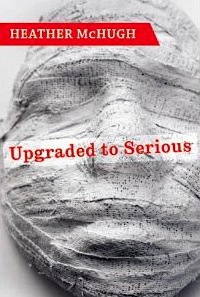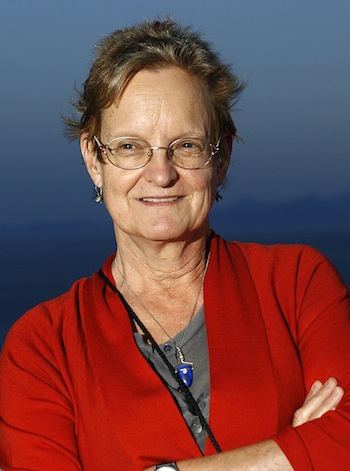
| Jacket 40 — Late 2010 | Jacket 40 Contents | Jacket Homepage | Search Jacket |
This piece is about 5 printed pages long.
It is copyright © Stephen Ross and Jacket magazine 2010. See our [»»] Copyright notice.
The Internet address of this page is http://jacketmagazine.com/40/r-mchugh-rb-ross.shtml
Heather McHugh
Upgraded to Serious
reviewed by
Stephen Ross
Copper Canyon Press USD 22 ISBN 1556593066 cloth, 120pp

1
Two quotations form the epigraphs to Upgraded to Serious, Heather McHugh’s latest poetry collection. By turns pithy and sonically exhilarating, they offer an excellent introduction to McHugh’s own poetry. The first, overhead in conversation, reads:
2
I use white-black life gain and self-burn, green-black discard rush, and blue-green
buildup creature crush.
3
The second, spoken by one Clenard the Grammarian, comes from Matthew Prior’s 18th-century Dialogues of the Dead [1]:
4
I love Method, extremely.
5
If this 300-year-old snippet sounds completely modern, this is precisely McHugh’s intention. Such radical re-contextualization is her trademark, her secret weapon, her Method.
6
McHugh’s poetry generates its unusual energy by dislocating, fracturing, and resetting words and phrases in new and startling contexts. As she explains in a recent essay, “My own energies tend toward centrifugal spray rather than tidy consolation.” [2] Her poems — sutured, scattershot — turn on ingenious punning and wordplay. They are studded with cunningly rearranged bits of language, from everyday bromides and sound bytes to echoes of ancient Greek poetry. As such, McHugh’s work emerges from the various 20th-century traditions in fragmentary poetics and invites comparison with the condensed, ironized colloquialism of her contemporary, Rae Armantrout. [3]

Heather McHugh
7
But unlike collage or otherwise disjunctive verse, McHugh’s poems move as fluent wholes, thanks in part to her artful use of rhyme, rhythm, and portmanteaux. If, in Friedrich Schlegel’s famous formulation, ancient poetry has become fragmentary over time, and modern poetry begins as fragments, then Heather McHugh’s poetry blurs the line between fragments and wholes, crafting one from the other. She delights both in dilating linguistic fragments into astonishing new wholes and in exposing and excavating language’s invisible fault-lines. “All poetry is fragment,” she writes, “it is shaped by its breakages, at every turn.” [4]
8
McHugh’s preoccupations with fragment and wordplay continue to prevail in Upgraded to Serious, which confirms her status as one of the most exciting American poets writing today. Upgraded follows closely on the announcement that McHugh is one of this year’s recipients of a MacArthur Fellowship, a five-year, 500,000 grant. In addition to winning the so-called “genius grant,” she has also been a finalist for both the Pulitzer Prize (2004) and the National Book Award (1995), and in 2001 was awarded the inaugural Griffin International Poetry Prize for Glottal Stop: 101 Poems, her translations of Paul Celan. Born in 1948, she has been affiliated with various artists’ colonies, colleges, and universities, most recently the University of Washington and Warren Wilson College.
9
While at first glance her latest venture appears preoccupied with morbid themes (the cover features a disembodied mummy head and the back cover shows McHugh standing impishly beside a spray-painted skeleton), Upgraded proves to be anything but a self-regarding slog through McHugh’s thoughts on death and life. Rather, her poems about these subjects, and many others, offer a refreshing return to — and reinvention of — staple poetic devices like wit and metaphysical speculation. At their best, they call to mind some of the finest work of poets as disparate as Dickinson and Hopkins.
10
Take, for instance, “Webcam the World,” a contemporary riff on Borges’s story “The Aleph,” in which a character sees everything happening everywhere from every perspective, all at once. McHugh’s poem — a mélange of slang and science jargon, colloquialisms, and poeticisms — aims for a similar inclusivity. Written for the age of YouTube, it bubbles with apocalyptic pathos and bathos:
11
Get all of it. Set up the shots
at every angle; run them online
24–7. Run the beautiful stuff (like
scenery and greenery and style)
and get the ugliness (like cruelty
and quackery and rue). There’s nothing
unastonishing — but get that, too. We have
to save it all, now that we can, and while.
Do close-ups with electron microscopes
and vaster pans with planetcams.
It may be getting close
to our last chance —
how many
millipedes or elephants are left?
12
The manic film director here is the poet herself, overwhelmed by the god-like task of cataloguing, describing, and laying claim to as much of the world as possible before both she and it disappear. Yet for McHugh, it’s never really the end of the world; later in the poem, she echoes God’s first words of Creation: “Let / mileage be footage, let years be light”. Despite its irreverent flair, “Webcam the World” belongs within the tradition of what might be called “divine listing” poems, from the Latin hymn “Benedicite, Omnia Opera Domini” to Section V of Whitman’s Song of Myself and Hopkins’s “Pied Beauty.”
13
McHugh’s affinities to a poet like Hopkins and to his contemporary, Emily Dickinson, are worth further mention, as such diverse parallels are rarely combined in contemporary poets. There is, on the one hand, her quicksilver instinct for rhyme, meter, and Hopkinsian “sprung rhythm”; on the other, there’s her Dickinsonian knack for condensation and preternatural perceptiveness. Her poem “Far Niente,” a delightful burst of philosophical reverie, comes at the reader like hip-hop lyrics:
14
Nothing is beyond our ken
and Everything is spurious.
Anything is close at hand
but we want Something — fast
and furious. Just to the stone men
near the end of the fever
takes the most curious
almost forever. Nothing is farther
again: Nothing is nearer
the truth. No one woke from the first —
we were wholly immersed —
then we burst into Youth.
15
“Far niente” or “dolce far niente” may mean “sweet idleness” in Italian, but this poem is anything but sweet and idle. Rather, the title phrase serves wholly as an aural spur to McHugh, inspiring the partly homophonic phrase “nothing is farther.” The fast and furious rhymes and counterpointing abstractions — ”Nothing-Everything-Anything-Something” — are an irresistible (”ear-resistible,” McHugh might say) reprieve from so much modern poetry that deliberately seems to ignore the ear and the intellect. [5]
16
Then there is McHugh in her aphoristic Dickinson-mode, as in “The Microscope”:
17
Through petri dishes’ rings
life is transmogrified. When we
look into things, we see
there’s space inside. [6]
18
Or at her most inspired, in the concluding lines of “The River Overflows the Rift”:
19
The word
must move: the minute does.
Its starred expanses dazzle
humankind (wherever there’s a mind
for wonderment). In time
the glimmers of the uncontained
outcourse even a lover’s frozen frown,
the silver wave revives the mower. Glowers
by glow are overcome, flowers by flow.
20
Though just shy of making clear sense, these lines demonstrate the way in which McHugh’s best writing pivots emotional content on the sounds and unforeseen metamorphoses of words. McHugh touches on this pivoting — or “hinging” — in the introduction to her 1994 selected poems, Hinge and Sign:
21
The sign moves by virtue of the hidden hinge; the poem signs, sighs, sings of meaning made moving… A poem contains meaning only the way a body contains life: moving, it IS it.
22
Reading McHugh’s work, we must recognize the many translingual puns, fanciful etymologies, and echoes of sound not as unqualified distortions of language but as deliberate and legitimate poetic choices. No linguistic fragment or emotional register is too subtle or commonplace for the movement — the glow and flow — of her imagination.
[1] Matthew Prior. Dialogue of the Dead: And Other Works in Prose and Verse (Cambridge: University Press, 1907), 209. “Clenard. ‘Hold good Charles, lett [sic] Us fairly State our matters, for I love Method, extremely.’”
[2] Heather McHugh. Broken English: Poetry and Partiality (Hanover; London: Wesleyan University Press, 1993), 68–9.
[3] Armantrout b. 1947; McHugh b. 1948.
[4] Heather McHugh. Broken English: Poetry and Partiality (Hanover; London: Wesleyan University Press, 1993), 75.
[5]For more information on the deliberate ignoring of the ear and the intellect, please consult: http://www.oxonianreview.org/wp/a-space-filled-with-moving/.
[6] Emily Dickinson, ca. 1860:
“Faith” is a fine invention
When Gentlemen can see —
But Microscopes are prudent
In an Emergency.

Stephen Ross
Stephen Ross is a PhD candidate in English literature at Oxford University and executive editor of The Oxonian Review. He is writing a thesis on John Ashbery and landscape.